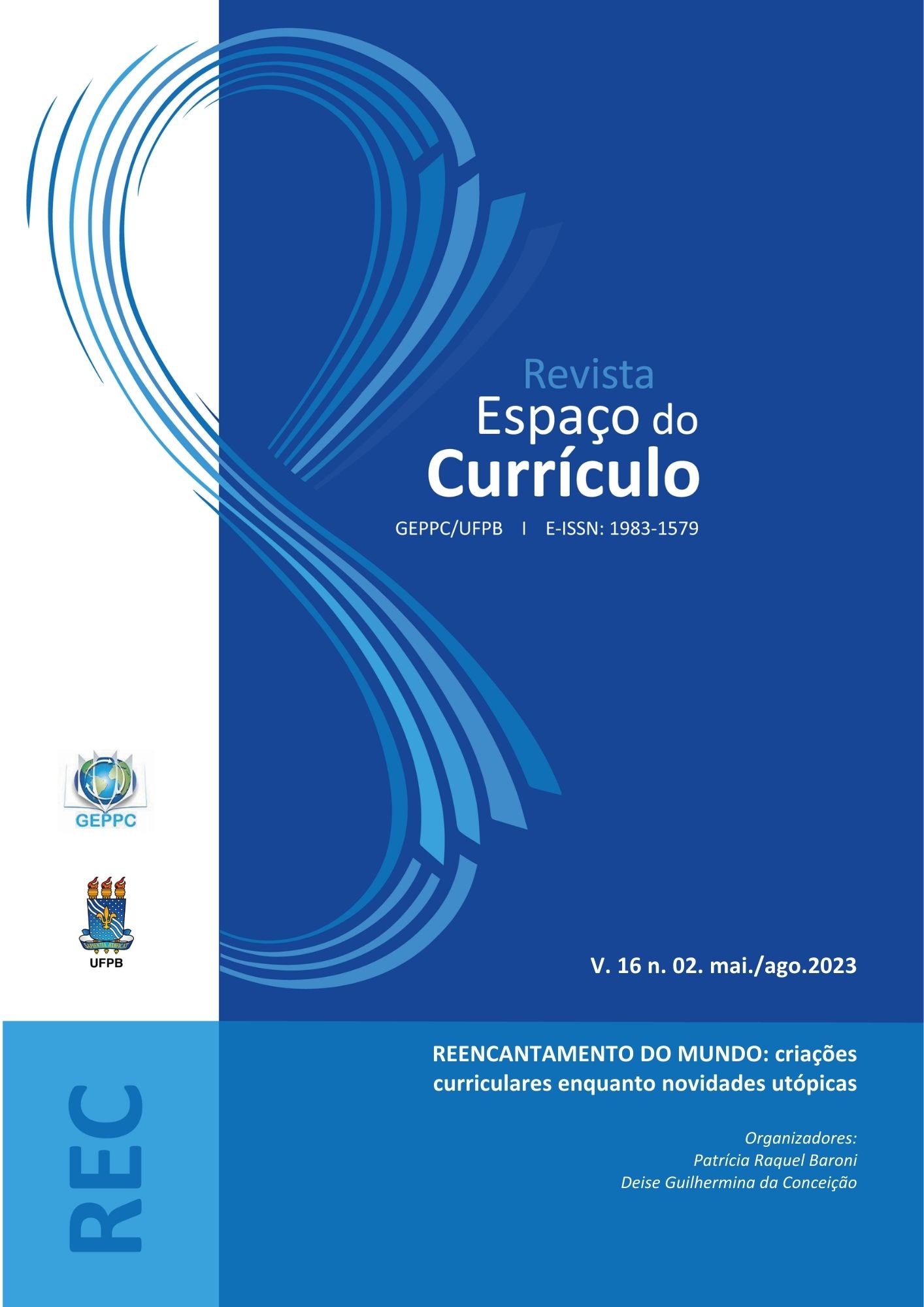WALKING THROUGH THE CURRICULAR GHETTOS
ethics, aesthetics, poetics in the ‘spacetimes’ of cities
DOI:
https://doi.org/10.15687/rec.v16i2.67277Keywords:
Curriculum artifacts, Cities, School routinesAbstract
This article aims to present part of the results of a project carried out with children enrolled in a public educational institution in the State of Rio de Janeiro. Considering the school as the 'space-time' to 'do-think' with children different ways of being and being in the world, being crossed by the poetics of the ghettos, the gingado of the streets, the arts of the centers and the peripheries. In this way, this study aims to develop a relationship of belonging with the city where the school is located, from conversations, photographs, drawings, walks, we will seek to (re) know places, identifying their cultural, ethical, poetic, aesthetic and social characteristics, seeking articulations between our experiences in the city. The results indicate that the students developed a relationship of belonging, establishing other links with the place where they live from the situations shared in the walks around the city.
Downloads
Metrics
References
ALVES, Nilda. Decifrando o pergaminho – os cotidianos das escolas nas lógicas das redes cotidianas. Em: Oliveira, I.; ALVES, N. (Ed.). Pesquisa nos/dos/com os cotidianos das escolas. Petrópolis/RJ: DP etal. 2001a. p. 13-38.
ALVES, Nilda. Imagens das escolas: sobre redes de conhecimentos e currículos escolares. Educar, Curitiba, n. 17, p. 53-62. 2001b. Editora da UFPR.
ALVES, Nilda; FERRAÇO, Carlos Eduardo; Soares, Maria da Conceição Silva. Michel de Certeau e as pesquisas nos/dos/com os cotidianos em educação no Brasil. Pedagogía y Saberes. Universidad Pedagógica Nacional Facultad de Educación. 2017, pp. 7-17 No. 46
ALVES, Nilda. Sobre as redes educativas que formamos e que nos formam. In Alves, Nilda. Práticas pedagógicas em imagens e narrativas – memórias de processos didáticos e curriculares para pensar as escolas hoje. S. Paulo: Cortez, 2019: 115 – 133.
BONAFÉ, Jaume Martínez. El discurso de la ciudad como curriculum de la vida cotidiana. Revista Vagalumear, v. 02, n. 02, 2022, p. 06-14
CALVINO, Ítalo. As cidades invisíveis. 1 ed. Trad. Diogo Mainardi. São Paulo: Companhia das Letras, 1990.
CASTRO, Maria Cecília Souza de. Andanças e migrações: conversas com os 'praticantespensantes' e com os currículos e os cotidianos escolares. 2023 (tese de doutorado).
CERTEAU, Michel de. A invenção do cotidiano. Artes de fazer. Tradução de Ephraim Ferreira Alves. Petrópolis, RJ: Vozes, 1994.
DELEUZE, Gilles. Diferença e repetição. Trad. Luiz Orlandi e Roberto Machado. Rio de Janeiro: Graal, 1988.
DELEUZE, Gilles; GUATTARI, Félix. Mil platôs 1: capitalismo e esquizofrenia. São Paulo: Ed. 34, 1995.
DELEUZE, Gilles; GUATTARI, Félix. O que é a Filosofia? 3.ed. Trad. Bento Prado Jr. e Alberto Alonso Muñoz. São Paulo: Editora 34, 2010.
FREIRE, Paulo. Política e educação: ensaios. 5. ed. São Paulo: Cortez, 2001.
HARVEY, David. Espaços de esperança. São Paulo: Edições Loyola, 2004.
HARVEY, David. Cidades Rebeldes: do direito à cidade à revolução urbana. São Paulo: Martins Fontes, 2014.
INGOLD, Tim. Linhas – uma breve história. Petrópolis/RJ: Vozes, 2022.
LEFEBVRE, Henri. O Direito à cidade. Trad. Rubens Eduardo Frias. 5. ed. São Paulo: Centauro, 2001.
LOPES, Alice Casimiro; MACEDO, Elizabeth. Teorias de currículo. São Paulo: Cortez, 2011.
LOPES, Jader Janer Moreira; GUIMARÃES, Iara Vieira. As experiências espaciais das crianças no espaço urbano. Educar em Revista, Curitiba, Brasil, v. 35, n. 73, p. 307-325, jan./fev. 2019
MACHADO, Antonio. Proverbios y cantares. PRIETO, Melquíades. Antología de la poesía española e hispanoamericana. 3 ed. Madrid: EDAF, 2005.
ORLANDI, Eni. Cidade dos Sentidos. Campinas: Pontes Editores, 2004.
OLIVEIRA, I. de. Currículos e pesquisas com os cotidianos: o caráter emancipatório dos currículos ‘pensadospraticados’ pelos ‘praticantespensantes’ dos cotidianos das escolas. Em: C. E. Ferraço & J. Magalhães Carvalho (Ed..). Currículos, pesquisas, conhecimentos e produção de subjetividades. Petrópolis: DP et Alli. 2012. pp. 47-70.
SCEGO, Igiaba. Minha casa é onde estou. São Paulo: Editora Nós, 2018.
SISSAKO, Abderrahmane. A vida sobre a Terra. La vie sur Terre. Mali: 1998. Duração 61 minutos.
SIMAS, Luiz Antonio. O corpo encantado das ruas [recurso eletrônico] / Luiz Antonio Simas. - 1. ed. - Rio de Janeiro : Civilização Brasileira, 2019.
Downloads
Published
How to Cite
Issue
Section
License
Copyright (c) 2023 Curriculum Space Journal

This work is licensed under a Creative Commons Attribution 4.0 International License.
By submitting an article to Curriculum Space Journal (CSJ) and having it approved, the authors agree to assign, without remuneration, the following rights to Curriculum Space Journal: first publication rights and permission for CSJ to redistribute this article. article and its metadata to the indexing and reference services that its editors deem appropriate.
















